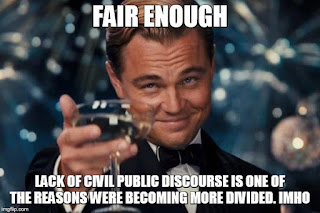Amused to Death
If you aren't particularly interested in watching a 10 minute video that's in remarkably low quality, allow me to provide a plot synopsis. Towards the beginning of the Second World War, a man named Ernest Scribbler writes a joke that is so funny he laughs until his death mere moments later. More come and read the joke, only to suffer the same fate. Eventually, the joke ends up in the hands of the British Military. After very carefully translating the joke (one word at a time) into German, they are able to weaponize it. It works marvelously. The Germans, unable to develop a joke of their own, surrender. Peace breaks out, and joke warfare is banned.
The tragic fate those who heard the funniest joke in the world can be accurately described as "amused to death". This is, however, not the type of amusing to death I wish to discuss here. I wish to consider Neil Postman's version of amusement resulting in death. As I'm sure you're all intimately aware, Postman believes that the Television ushered in new age. An age where value is derived from how much attention one can capture. An age where entertainment has become the primary faucet from which all information flows.
I have a single, very simple, question to ask. Is that so bad? There are scores of late-night news shows that don't pretend to offer information without entertainment. Last Week Tonight, The Daily Show, The Late Show, with Steven Colbert, just to name a few. These shows offer comedy and information in equal measure.
Imagine a world were you have the choice to sit down and let the world spin without you for a bit, one where you can deal with problems without taking them seriously. A world where being amused to death is not mutually exclusive with leading a fulfilling life. Why shouldn't I be able to laugh at a serious problem? It is not as if I can't still fix it.
Postman equates amusement in places he deems inappropriate as the downfall of public discourse, but it seems to me that such amusement is merely a symptom of the disease. Flashing lights and catchy music in a news show isn't gonna pollute the public sphere.
There is much else I could say about this. I could talk about how Postman's entire work is built on the supposition that things matter, and how things mattering is antithetical notions of freedom and free will. I could talk about how satire is an age old form of discourse that has carried significant contributions to public discourse. But, what I wish to say is this: amusement until death is far from a bad deal, and Ernest Scribbler did nothing wrong.
Good luck

This is a very interesting post. I have never heard of the story of Ernest Scribbler, and it is certainly interesting to put this story in the context of today's world. As for your question, I think an age where entertainment has become the primary faucet for information is not always a bad thing. Everyone needs time to sit down and watch some entertainment; I think it is a nice break for people. However, I think the issue occurs when people watch this entertainment constantly and take it as fact. I feel that entertainment and news should probably not be intertwined because of this reason. News channels are not telling the news anymore, they are telling stories to get views. They are entertainment shows. People then watch these shows and take everything they say as fact, because well, they should be able to. But due to this entertainment based society, news channels will not stay in business if only the news is shown. I think that is the issue that Postman is getting at, entertainment breeds misinformation.
ReplyDeleteI have not heard of this story before. Have we tried this out in the real world? It may be very effective lol. I think sometimes you have to laugh at serious issues and problems in order to cope and get by. Entertainment is just unfortunately one of the only ways people can pay attention to information. If I had the chance between reading a really long, technical book about eye surgery and watching a YouTube video by a doctor with visuals and explanations, I will choose the YouTube video. I think it also has to do with us being more visually inclined rather than textually. Our eyes are drawn to images before they are to text. We naturally look for pictures first.
ReplyDeleteThis was an interesting story with a joke being so funny that it could lead to someone's death. I also have not heard of this. To answer your question on Postman's belief on how value is derived from how much attention one can capture. This can cause issues at times as some important news or information may not be spread as much as it should be. You mention also how Postman sees it as an age where entertainment has become the primary faucet from which all information flows. This could be quite harmful as entertainment should never be the source where people obtain their information as they have nothing to do with each other. It happens way too often where entertainment shows can feed misinformation and because of that, it can cause harm to certain things or individuals.
ReplyDeleteI love this sketch. Hilarious! The thing is, Monty Python is a great example of using humor to make a political statement. This sketch is actually a very sophisticated critique of war. Much of their work was, in fact, political (although much of it was also just silly, and often it is difficult to tell the difference).
ReplyDelete